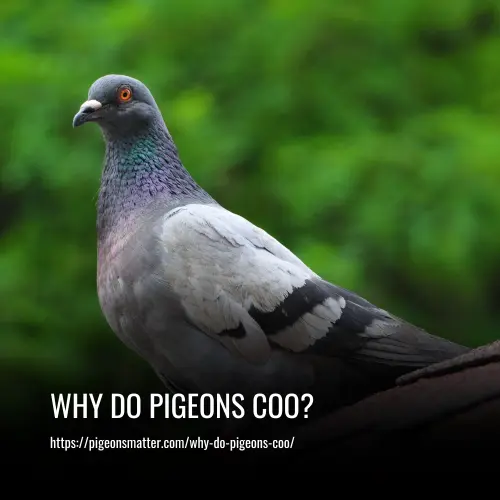Pigeons are a common sight in urban and rural environments, known for their distinctive cooing sound. Have you ever wondered why they make this sound? Understanding the reasons behind a pigeon’s cooing behavior can provide insight into their communication and social interactions.
Reasons Why A Pigeon Cooing:
- Calling Partners for Mating
- Declaring Territories
- Communicating and Socializing with Other Pigeons
- Signaling About Predators
- Signaling the Presence of Food
- Expressing Fear or Stress
- Comfort and Contentment

Reasons Why A Pigeon Cooing
Pigeons coo for various reasons, including calling partners for mating, declaring territories, communicating and socializing with other pigeons, and signaling about predators.
1. Calling Partners for Mating
Pigeons breed for about 183 days, with the most common season being spring and summer. Male pigeons make melodic cooing noises to attract female partners, even after mating. They also coo to show affection to their partner.
2. Declaring Territories
Pigeons coo to declare their claim over a nesting area and to make invaders disappear. The cooing can be accompanied by grunting noises when they feel threatened.
3. Communicating and Socializing with Other Pigeons
Pigeons coo to transmit signals within their flock, whether it’s for courtship, rivalry, or passing on information about food sources or nesting places.
4. Signaling About Predators
Pigeons send distress calls through cooing when predators approach their nest. They also make coos to alert their companions about predators in the area.
5. Signaling the Presence of Food
Pigeons are communal and gregarious birds, often searching for food together. They use cooing to signal the presence of food to other birds, allowing them to eat together.
6. Expressing Fear or Stress
Like any other animal, pigeons can coo to express fear or stress. This type of cooing will be different from their usual calls and can indicate their emotional state.
7. Comfort and Contentment
Pigeons will often coo softly when they are feeling calm and secure. They also use cooing to communicate with other pigeons and express their overall emotional state.
Pigeons coo for various important reasons such as attracting mates, declaring territories, socializing, and alerting about predators. It is a crucial part of their communication and behavioral patterns. Understanding why pigeons coo frequently can provide insight into their lifestyle and interactions in the wild.
The Various Sounds of Pigeons: What They Mean
Pigeons, like any other animal, communicate through different sounds to convey various meanings. Here are a few examples:
1. Grunting When They Are in Danger
When pigeons sense trouble, they will start grunting, often using this sound to signal other pigeons of potential danger. The grunts are short and not drawn out, serving as a warning to others.
2. Hissing When a Predator Gets Too Close
Young pigeons, or squabs, will hiss when predators are nearby to alert their parents of the potential danger, as they have little means of defending themselves.
3. Whistling During Flight
Pigeons tend to whistle when they are about to take off, producing a soft whistle during typical takeoffs. However, when caught by surprise or in the presence of danger, the whistling becomes very loud.
4. Communication and Stress Expressions
The coos of pigeons can convey different meanings. They can be mating calls or warnings to other pigeons in a claimed area. However, their coos for expressing loneliness or stress have a slightly different tone, which can be distinguished by those familiar with their vocal sounds.
Do All Pigeon and Dove Species Coo
Pigeons and doves are all in the same taxonomic family: Columbidae. In other words, there’s no difference between a pigeon and a dove. There are 344 species in the Columbidae family, and most pigeon and dove species make some sort of cooing sound.
Each species has its own set of sounds, but they tend to have in common a flute-like tone that contains a distinct “o” sound. For example, the Mourning Dove is named for its song that sounds like a mournful cry, with a “coo-OOO-oo-oo” call that peaks in the middle.
Why Do Pigeons Coo In the Morning
After a night of sleep, pigeons tend to go out in the morning in search of food. Once a food source is available, they might express happiness or satisfaction through their coos, which also signals to other birds in the flock about the nearby food source.
Squabs or baby pigeons make a different type of cooing noise, known as squeaking, to express hunger or to draw their parents’ attention. If they are scared, lost, or injured, they will make the same noise to call for help.
The fresh morning breeze can also be a reason behind the happiness, which is why pigeons are cooing. When they find other birds in the vicinity, they start expressing satisfaction or happiness through their coos.
Why Do Pigeons Coo At Night
Pigeons cooing at night can be annoying for many people as they try to relax. Pigeons typically sleep about ten hours at night but may switch between wakefulness, non-REM sleep, and REM sleep, meaning they won’t be in a deep sleep all night long.
When they are awake at night, they may coo to communicate with their partners or other birds in the flock, or make prolonged coos if they sense danger. Predators often attack pigeons while they are resting at night, so it is common for them to coo.
Another reason is the change in their sleep cycle, particularly in urban areas with lots of artificial light that can disrupt their sense of day and night. Thus, pigeons may not sleep when expected and will continue to coo while awake.
Why Do Pigeons Coo Constantly
Cooing is common among wild pigeons, but constant cooing may indicate distress or alert. Mating calls or regular communication are characterized by medium pitch and breaks, while distress calls have a higher pitch and longer length. This behavior is also common among pet pigeons, so it’s important to check for signs of fear, discomfort, hunger, or illness.
The Anatomy Of Pigeon Cooing
Pigeons produce cooing sounds through their syrinx, the avian equivalent of the larynx in humans. This enables them to control the muscles to create a range of different sounds, from soft coos to loud caws. Their beak shape amplifies and modulates the sound waves generated by their vocal cords.
Hormones also play a role in regulating pigeon cooing behavior, with increased testosterone levels in male pigeons during breeding season leading to more cooing to attract mates. Female pigeons may produce more coos when ready to lay eggs or incubate, as this behavior is regulated by hormones like prolactin and oxytocin.
The Cultural Significance Of Pigeon Cooing
Pigeon cooing has been culturally significant throughout history. In ancient Greece, pigeons were associated with peace and love as symbols of Aphrodite, the goddess of love. They were seen as messengers of peace. Additionally, pigeons have been used as messenger birds to carry messages between distant locations since ancient civilizations such as the Persians and the Romans.
In many cultures, pigeons are symbols of peace, love, and prosperity. Their coos are often associated with positive and uplifting emotions. Some cultures believe that pigeon cooing brings good luck and wards off negative energy, while in others, it is seen as a sign of prosperity and abundance.
What Other Noises Do Pigeons Make
Pigeons are known for their distinctive cooing sounds, but they are capable of making a wide range of other noises as well.
Cawing: Pigeons will occasionally make a loud, harsh cawing sound, which is often used to communicate alarm or distress.
Chirping: Pigeons may make a series of soft, high-pitched chirping sounds when they are feeling playful or excited.
Clucking: Pigeons may make a series of soft, throaty clucking sounds when they are feeling content or relaxed.
Whistling: Pigeons may make a series of soft, whistling sounds when they are trying to attract a mate or communicate with other birds.
Hissing: Pigeons may hiss when they are feeling threatened or aggressive, as a way to deter potential predators or rivals.
How Old Are Pigeons When They Start Cooing
Some baby pigeons may start cooing as early as 26 days old, while others may not begin making coo sounds until around 7 to 8 weeks after birth. Generally, it takes about two months for chicks to start cooing, with most of them making coo sounds right after the 7-week mark.
However, there is variability in the age at which pigeons start cooing, and not all chicks will begin cooing at the same time.
Environmental Factors That Influence When Pigeons Start Cooing
Several environmental factors can directly influence when pigeons start to coo. These factors play a crucial role in the growth and maturity of pigeons, affecting their ability to coo at the right time.
1. Living Conditions
Pigeons, like humans, require proper living conditions for healthy growth and development. If a baby pigeon is kept in a stressful or crowded environment, it may experience delayed growth, leading to a later onset of cooing. Ensuring a comfortable and stress-free environment for the pigeons is crucial for their timely development.
2. Nutrition and Health
The diet of pigeons is crucial for their growth and maturity. A lack of proper nutrition can lead to delayed maturity and a delayed onset of cooing. It is essential to provide pigeons with a nutritious diet to ensure that they reach maturity and start cooing at the right time.
3. Seasonal Conditions
While adult pigeons tend to coo more during the breeding season, which occurs in the spring and summer months, this does not directly influence the cooing onset in chicks. However, unfavorable seasonal conditions can impact the growth of the chick and result in a delayed onset of cooing.
By understanding and addressing these factors, pigeon owners can ensure that their birds develop and start cooing at the appropriate time.
What Behaviors Do Pigeons Exhibit Before They Start Cooing
Before baby pigeons begin to coo, they exhibit other behaviors. These include making whistling or squeaking noises to get the attention of their parents. The chicks typically make these sounds when they are hungry or uncomfortable in their nests.
Additionally, the baby pigeons can start to move around a little before learning to coo. This movement also helps them catch the attention of their parents.
How Often Pigeons Coo
Adult Pigeons: Adult pigeons are known to coo at all times of the day, including during the night. They vocalize frequently throughout the day without any specific trigger.
Baby Pigeons: In contrast, baby pigeons are generally quiet and do not coo unless they need something. They will only vocalize when they are seeking their parent’s attention, which usually occurs when they are hungry.
Do Pigeons Coo Like Doves
Both pigeons and doves make cooing sounds, with cooing being the most recognizable characteristic for these birds. However, the cooing sound of a dove and the coos of the pigeons are not the same.
Dove coos are a bit more melodic and smoother, while pigeon coos are a bit repetitive and sometimes a little guttural. Furthermore, the coos of doves are longer in length, whereas pigeons generally do not make a longer coo sound.
What Is the Typical Sound of a Pigeon Cooing
Pigeons coo in a rhythmic and soft manner, typically making a low-pitched “coo-coo” or “coo-roo-coo-coo” sound. The coos of baby pigeons, known as squabs, are usually high-pitched and may also include chirping, trilling, and peeping sounds.
However, the sound of the chicks’ coos develops over time, with their coos at seven to eight weeks old being much different than those made when they are more than 3 months old.
FAQs
Pigeons use their cooing sound to communicate with other pigeons. The coo is a low, quiet sound that conveys information about their location, emotional state, and intentions. Pigeons coo to let other pigeons know they are nearby, to warn them of danger, attract mates, and establish bonds with other pigeons.
A pigeon’s coo is a low, soft sound that is used as part of their courtship behavior to attract a mate. Both male and female pigeons produce this cooing sound. The cooing communicates the availability and interest of the caller to potential mates. It also helps pigeons to identify and recognize each other, as each bird has a unique coo.
When a pet pigeon coos, it usually means they are trying to communicate with other pigeons. They may be trying to attract a mate or defend their territory. Sometimes, they will also display certain behaviors like strutting, bowing, or fanning their tails while cooing.
Pigeons make their annoying noise as a way to attract mates. Their songs are repetitive coos that are usually soft and barely audible to humans. However, in large groups, pigeons can create a lot of noise that can be annoying to people. They may also grunt when they are distressed.
Pigeons coo and bow as part of their courtship behavior. The male pigeon will bow, coo, inflate his throat, and strut in a circle around the female to court her. They may also preen each other and the male may regurgitate food as a courtship gesture. When the female is ready to mate, she will crouch down and the male will jump on her back.
Pigeons may squeak for various reasons, but one common reason is when they are hungry and waiting for their parents to feed them. This behavior is often observed in baby pigeons or nestlings. If you have a photo, it might help in identifying the specific reason for the squeaking.
Pigeons coo and walk in circles for various reasons. One possible reason is that they are threatening a rival. They may bow, coo, inflate their throat, and walk in a circle as a display of dominance. Another reason is during courtship. Male pigeons will bow, coo, inflate their throat, and strut in a circle around the female to attract her as a mate.
Yes, both male and female pigeons can coo.
Female pigeons typically coo less than male pigeons, so you might not hear them cooing in the morning. However, they may start cooing at night, especially if they have babies in the nest that they are trying to protect.
Yes, pigeons do try to communicate through cooing. Cooing is a form of communication for both adult pigeons and their babies, known as squabs. However, the coos of squabs are different from those of adults. Squabs make squeaking sounds, whistles, and sometimes even hissing sounds, each with its own meaning.
Pigeons scream in the morning because they are socializing and communicating with each other. Their coos can sound like screaming, especially when they are excited or looking for food. This behavior is more common in the morning when they wake up and start their daily activities. It can also happen in the evening when they return to their nesting area.
Pigeons are known for being active at all times of the day, including during the night. The noises you are hearing are likely cooing, which is how pigeons communicate with each other. The cooing may be a way for pigeons to establish their territory or communicate with other pigeons. It is normal for pigeons to coo at night and engage in conversation among themselves.
Yes, it is normal for pigeons to coo at night. Pigeons are active during both day and night, and it is natural for them to make sounds during their active periods. However, if a pigeon is not cooing when it is normally active, it could be a sign of illness, injury, stress, or problems with its vocal system. Overall, there is no need to worry if your pigeons coo at night, as it is a natural behavior for them.
Male and female pigeons can both coo, and it is not necessarily true that one gender coos more than the other. The amount of cooing can vary depending on the individual bird and the situation. Pigeons use cooing as a way to communicate with each other and with humans, and both males and females may coo for various reasons, such as expressing their emotions, defending their territory, or attracting a mate.
Pigeons use various types of cooing to communicate different messages. Male pigeons use mating coos to attract females, while territorial cooing is more aggressive and is used to assert their dominance over nesting areas and ward off intruders. Pigeons also coo to communicate and socialize with other pigeons, indicating food sources and nesting spots.
Yes, pigeons use cooing to establish and maintain territories. They coo loudly to announce their presence and to warn other pigeons about potential intruders. Territorial cooing is often more aggressive and serves as a way for pigeons to assert dominance within their group.
Conclusion
In conclusion, the cooing behavior of pigeons serves several important functions. It is used as a form of communication between pigeons, helping them establish and maintain social bonds. Additionally, cooing can serve as a way for pigeons to attract mates and defend their territory. Understanding the reasons behind pigeon cooing not only provides insight into their behavior, but also sheds light on the complex social dynamics of these birds.
As humans, we can appreciate the significance of communication and social interactions in the animal kingdom, and gain a deeper understanding and appreciation for the natural world around us.


